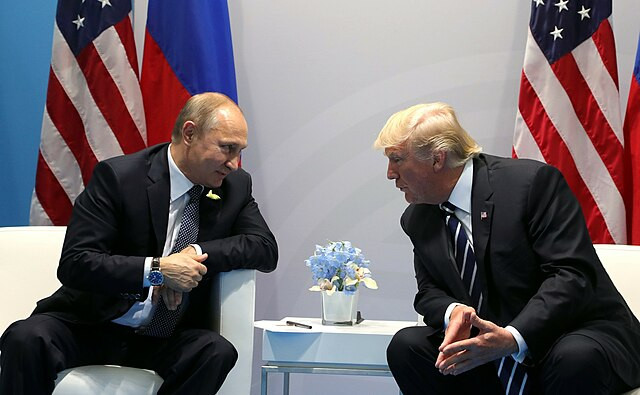President Donald Trump escalated his rhetoric on foreign adversaries ahead of his self-imposed April 2 "Liberation Day" tariff deadline, threatening new sanctions on Russia and Iran while warning that failure to reach peace in Ukraine could trigger sweeping economic penalties.
In a phone interview with NBC News' Kristen Welker, Trump said he was "very angry - pissed off" over Russian President Vladimir Putin's recent comments questioning Ukrainian President Volodymyr Zelensky's legitimacy. "That's not going in the right location, you understand?" Trump said, referencing Putin's suggestion that Ukraine may need a "temporary administration" before peace negotiations could move forward.
Trump continued, "But new leadership means you're not gonna have a deal for a long time, right? ... But I was pissed off about it. But if a deal isn't made, and if I think it was Russia's fault, I'm going to put secondary sanctions on Russia."
He later elaborated, telling Welker, "If Russia and I are unable to make a deal on stopping the bloodshed in Ukraine, and if I think it was Russia's fault - which it might not be - but if I think it was Russia's fault, I am going to put secondary tariffs on oil, on all oil coming out of Russia."
Putin's comments came Friday, when he said Ukraine lacked a legitimate leader to negotiate a peace deal and proposed the idea of an interim government until democratic elections could be held. The Associated Press reported that Putin claimed any agreement under Zelensky could face pushback and instead called for "temporary governance" before signing a treaty.
While Trump offered no specific details on how the proposed secondary tariffs would be enforced, he made clear the consequences would be significant if Russia stalls efforts for peace.
The April 2 tariff rollout is expected to include a 25% tariff on foreign automobiles and parts, alongside reciprocal tariffs targeting unspecified countries. Trump has dubbed the initiative "Liberation Day," presenting it as a cornerstone of his second-term trade policy.
In the NBC interview, Trump also suggested additional tariffs on Iran. "I am considering putting on secondary tariffs on Iran ... until such time as a deal is signed," he said, referencing the nuclear standoff. Iranian President Masoud Pezeshkian on Sunday rejected direct talks with Washington over the nuclear issue.
Trump withdrew the U.S. from the 2015 nuclear agreement with Iran during his first term and has since maintained pressure through sanctions. His comments Sunday reaffirmed a continuation of this approach.
Despite threats of tariffs and new sanctions, Trump expressed some openness to negotiations. "Only if people are willing to give us something of great value. Because countries have things of great value. Otherwise, there's no room for negotiation," he told Welker.
National Economic Council Director Kevin Hassett said Sunday the president had yet to finalize the list of countries facing tariffs. "President Trump is going to decide how many countries," Hassett told Fox News' Maria Bartiromo. "He's got a lot of analysis before him, and he's going to make the right choice."
The proposed tariffs are causing uncertainty for markets and business leaders. During Trump's first term, the use of tariffs-particularly against China-was a hallmark of his trade strategy, drawing both praise for protecting U.S. industry and criticism for raising costs on American consumers.
Peter Navarro, Trump's senior counselor for trade and manufacturing, defended the strategy. "Tariffs are tax cuts, tariffs are jobs, tariffs are national security, tariffs are great for Americans," Navarro said on Fox News. "Tariffs will make America great again."
Pressed by host Shannon Bream on the economic consequences for consumers, Navarro insisted that revenue from auto tariffs would support "the biggest tax cut in American history for the middle class."
He also argued that foreign exporters would absorb most of the costs. "We know that we imposed historically high tariffs on China ... and all we got out of that was prosperity and price stability," Navarro said. "The reason why we're not going to see inflation is because foreigners are going to eat most of it. They have to."






